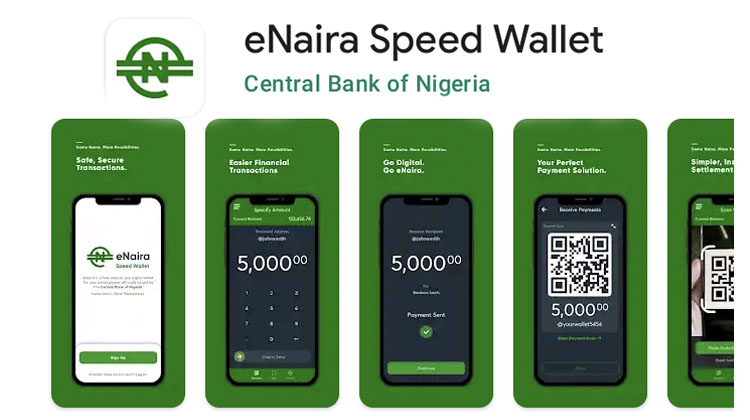

2022-04-02 12:00:00 AM | 1801 ![]() Print
Print ![]() PDF
PDF

On Monday, Nigeria’s, eNaira, was launched by President Muhammadu Buhari at the State House in Abuja.
The eNaira was developed by the fintech company, Bitt, based in the Caribbean.
At the launch on Monday, the Central Bank of Nigeria governor, Godwin Emefiele, said 500 million eNaira ($1.21 million) had already been minted.
The CBDC’s digital currency app and its merchant wallet also became available for download after going live. An earlier plan to unveil the digital currency on October 1 was shelved.
Nigeria is one of only a few countries in the world and certainly the first in Africa to develop an official digital currency.
While the currency has taken off, many Nigerians say they still do not understand how it operates and why the country needs a digital currency in the first place.
Here are 10 major things you should know about the eNaira and how it works:
1. It’s the digital form of the Naira
The eNaira is the digital form of the Nigerian physical Naira currently in circulation. It is issued by the CBN in line with Section 19 of the CBN Act. In essence, it is a direct liability of the Nigerian apex bank. Built on a blockchain open ledger technology that prevents duplication or creation of fake units, each eNaira note will be unique and different.
2. Is the eNaira same as Cryptocurrency?
No, it isn’t. The eNaira is simply a digital currency issued and backed by the authority of the Nigerian government and is a legal tender equivalent to the physical cash. It is quite unlike Bitcoin and other cryptocurrencies that have no backing of established authorities. The eNaira is pegged against the traditional Naira and will not fluctuate due to market influence at a different rate from the traditional Naira. The eNaira basically eases transactions and offers digital stability, thus reducing the need for physical cash.
3. eNaira at par with N1
The eNaira is a legal tender and will form part of the currency-in-circulation. More importantly, the e-naira will be at par with the physical Naira, maintaining the same exchange value as the Naira What this means is that one eNaira is of the same value as one traditional Naira i.e N1=1 eNaira.
4. What’s eNaira Wallet?
The eNaira wallet is required to access, use and hold the eNaira. The eNaira will be exchangeable for other Central Bank Digital Currencies (CBDC). The eNaira will be made accessible only through the eNaira Wallets which is the digital storage that holds the eNaira.
5. How exactly will eNaira work?
The eNaira will be provided by the CBN to intermediaries (i.e financial institutions) who would in turn help supply to individuals/customers. These institutions would maintain a treasury wallet to collect eNaira from the CBN. They would thereafter oversee ID verification, eNaira payment processing, and the generation of wallets for Nigerians to keep their eNaira. Through the app, customers would be able to identify a bank of their choice, connect to their bank accounts and carry out transactions.
6. Are there transaction or/and balance limits?
Yes, there are transaction and balance limits for individual eNaira wallets. These have been drawn out by the CBN.
For Tier 0, the daily transaction and balance speed wallet limits are N20,000.00 and N120,000.00, respectively. For Tier 1, daily transaction and balance speed wallet limits are N50,000.00 and N300,000.00, respectively.
For Tier 2 customers, daily transaction and balance speed wallet limits are N200,000.00 and N500,000.00, respectively. Finally, for Tier 3 customers, daily transaction and balance speed wallet limits are N1,000,000.00 and N5,000,000.00, respectively, while there isn’t any limit for Merchants.
7. How do you onboard and make use of the platform?
Yes, there are various requirements for onboarding. The onboarding of Financial Institutions (FIs) shall be done automatically by the CBN while Merchants shall be onboarded by the FIs upon downloading the “eNaira Speed Merchant App” from the app stores and fulfillment of certain registration requirements.
The MDAs shall be onboarded by the CBN upon receipt of the appropriate mandate.
Consumer onboarding shall be self-service upon downloading of the “eNaira Speed App” from the app stores and fulfillment of certain requirements, including (a) provision of all mandatory requirements; (b) acceptance of the Terms and Conditions of eNaira speed app; and (c) acceptance of the Privacy Policy of eNaira speed app.
8. Are there charges for using the eNaira platform?
The CBN said that charges for transactions that originate from the eNaira platform shall be free for the first 90 days commencing from October 25, 2021. However, it would revert to applicable charges as outlined in the Guide to Charges by Banks, Other Financial, and Non-bank Financial Institutions.
9. Why eNaira in the first place?
The eNaira is expected to complement traditional Naira as a less costly, more efficient, generally acceptable, safe, and trusted means of payment. In addition, the CBN said in its guide that it will improve monetary policy effectiveness, enhance the government’s capacity to deploy targeted social interventions, and boost remittances through formal channels. There is the elimination of the third party in transactions which could reduce the time and cost of transactions. More importantly, there is the ease with which it would complement the inclusion of excluded people in the financial system.
10. Who will be affected by the digital disruption?
A major advantage that the e-naira brings is the deepening of financial inclusion. Hence, it would ease financial transactions and affect individuals, businesses, non-governmental organizations (NGOs), religious institutions, Diaspora Nigerians, MDAs, etc.
The categories include Tier 1 (unbanked) customers who are expected to register with telephone numbers being the minimum requirement (for those awaiting NIN verification). The Tier 2 customers equally are expected to register with a Telephone number (NIN verified). For Tier 3 and Tier 4 customers with existing bank accounts, the minimum requirement is BVN.
For the last category, merchants and businesses, the registration requirement include full KYC requirement (including BVN, TIN, and Bank confirmation) and compliance with the Anti-money laundering and counterfeit terrorism regulation of the CBN.
In what way has the eNaira Initiative been positive to the current economy since its inception? can we blame the lack of patriotism as the foundation root of the masses yet to adopt or feel its impact since October 25 2021 and we now see Naira falling to N600 per dollar in the parallel market?
Let's have your comments below:

Instaforex-Africa is an online forex broker agency that will provide you the technical know hows on how you will succeed in your quest to become successful with your online forex trading. We provide the forex trading platforms and free forex trading tutorials. Call us today on 08133450038 and get our professional agent guide you through the process of setting up a demo account.
INSTAFOREX FOREX TRADING REVIEW
Nigeria e-Naira wallet Explanation
How To Fund Forex Account in Nigeria
Profitable Forex Trading System That Works
Successful Forex Traders Strategies
Forex Trading Strategies For Beginners
No Deposit Forex Bonus Best Forex Bonus